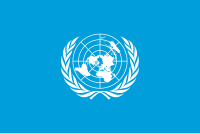Szerkesztő:Carlos71/MONUA
| Missão de Observação das Nações Unidas em Angola (MONUA) | |
 | |
 | |
| Angola térképe | |
| Alapítva | 1997. június 30. |
| Megszűnt | 1999. február 26. |
| [http://MONUA A Missão de Observação das Nações Unidas em Angola (MONUA) weboldala] | |
A MONUA (portugálul: Missão de Observação das Nações Unidas em Angola, angolul: United Nations Mission of Observers in Angola, magyarul: az Egyesült Nemzetek Angolai Megfigyelő Missziója) az Egyesült Nemzetek Szervezetének békefenntartó missziója volt Angolában, az 1997. június 30-tól 1999. február 26-ig terjedő időszakban. Feladata a kormányon lévő MPLA és a vele szemben álló UNITA közötti megbékélés és a hosszútávú béke elősegítése volt. A misszióban fegyvertelen magyar rendőri és katonai megfigyelők is részt vettek.
Története[szerkesztés]
Létrehozása és általános célja[szerkesztés]
Az ENSZ biztonsági tanácsa 1997. június 30-án, az 1118-as határozat elfogadásával hozta létre a MONUA elnevezésű békefenntartó missziót. A határozat szerint az új szervezet 1997. július 1-jén kezdte meg tényleges működését. Angolában ezt megelőzően is voltak békefenntartó missziók UNAVEM I, UNAVEM II és UNAVEM III néven, amelyeket az angolai polgárháború folytatásának megakadályozására hoztak létre. A MONUA célja ezekhez hasonló volt. Feladata a kormányon lévő MPLA és a vele szemben álló UNITA közötti megbékélés, a hosszútávú béke és a nemzeti konszolidáció elősegítése, valamint a demokratikus fejlődéshez és újjáépítéshez szükséges háttér biztosítása volt. Ugyancsak a feladatai közé tartozott a leszerelési folyamat, valamint az UNITA tagjainak az Angolai Hadseregbe (FAA), az Angolai Rendőrségbe (ANP) és az állami közigazgatásba való integrálódásának elősegítése. Emellett biztosítania kellett a személyek és az áruforgalom szabad mozgását gátló tényezők kiküszöbölését és a polgári lakosság lefegyverzését.[1]
A MONUA mandátumát a főtitkár ajánlása alapján a biztonsági tanács több alkalommal meghosszabbította. Utoljára 1998. december 3-án került erre sor az 1213-as határozat alapján. 1999. február 26-án a mandátum újból lejárt és ekkor az 1229-es határozat alapján azonnali hatállyal megszüntették a missziót. A megszüntető határozat ellenére a fegyveres erőkre vonatkozó rendelkezések érvényben maradtak a MONUA utolsó egységeinek távozásáig. A misszió azon csoportja, amely az emberi jogok betartását vizsgálta a felszámolás ideje alatt is folytatta tevékenységét.[1]
Politikai célja[szerkesztés]
MONUA’s Division of Political Affairs would assist the Special Representative of the Secretary-General in implementing the political mandate of the mission. The Division would also:[2]
- Monitor the normalization of State administration throughout the country;
- Provide good offices and mediation at the provincial and local levels and participate in the official organs established for that purpose;
- Monitor and verify the integration of UNITA elements into State structures, as provided for in the Lusaka Protocol and subsequent agreements between the Government and UNITA, and assist in the resolution and management of conflicts which may arise;
- Promote, in coordination with other components, a climate of confidence and national accord by establishing a presence in major population areas and areas of tension.
Rendőri célja[szerkesztés]
With the withdrawal of United Nations military personnel and the gradual normalization of State administration over the entire Angolan territory, the civilian police component of MONUA would:[2]
- Verify the neutrality of the Angolan National Police;
- Verify the incorporation of UNITA personnel into the national police;
- Verify the quartering and occasional deployment of the rapid reaction police;
- Verify the free circulation of people and goods;
- Give special attention to respect for civil and political rights and freedoms;
- Carry out joint patrols with the Angolan National Police, especially in areas formerly controlled by UNITA;
- Inspect prisons and, if need be, establish its temporary presence at national police posts and stations;
- Monitor and verify the collection of weapons recovered from the civilian population;
- Supervise proper storage or destruction of these weapons;
- Oversee security arrangements for UNITA leaders.
Célja az emberi jogok betartása terén[szerkesztés]
The human rights component of MONUA would:[2]
- Contribute to the promotion of human rights and prevention of their abuse in the country;
- Help develop the capacity of national institutions and non-governmental organizations in the field of human rights;
- Investigate adequately allegations of abuses and initiate appropriate action.
Katonai célja[szerkesztés]
The military component of MONUA would:[2]
- Verify compliance with various aspects of the ceasefire regime;
- Investigate allegations of offensive troop movements, the presence of any UNITA armed elements and the existence of weapons caches;
- Monitor the dismantlement of checkpoints and UNITA command posts;
- Monitor the integration of UNITA soldiers into the Angola Armed Forces.
Humanitárius célja[szerkesztés]
The Humanitarian Assistance Coordination Unit would:[2]
- Support the demobilization of UNITA ex-combatants and their social reintegration;
- Monitor the emergency situation and maintain a capacity to respond to humanitarian needs as they emerge;
- Serve as the focal point for information, donor liaison and coordination of humanitarian operations through an established network of field advisors in key provinces.
Fontosabb események[szerkesztés]
Jegyzetek[szerkesztés]
- ↑ a b UN: United Nations Mission of Observers in Angola (angol nyelven). (Hozzáférés: 2009. szeptember 2.)
- ↑ a b c d e UN: United Nations Mission of Observers in Angola/Mandate (angol nyelven). (Hozzáférés: 2009. szeptember 7.)
- ↑ UN: United Nations Mission of Observers in Angola (Background) (angol nyelven). (Hozzáférés: 2009. szeptember 2.)
Források[szerkesztés]
- UN: United Nations Mission of Observers in Angola(angolul)
- UN: United Nations Mission of Observers in Angola (2)(angolul)
- UNHCR:Human Rights Watch World Report 1999 - Angola(angolul)
- UN News Centre: Life of UN envoy Alioune Blondin Beye celebrated on anniversary of his death(angolul)
- Alioune Blondin Beye emlékoldala(angolul)
- BBC News: Angola envoy confirmed dead, 1998.06.29.(angolul)
- BBC News: Endless patience of Angola envoy, 1998.06.29.(angolul)
- Polícia Militar do Maranhão: Missões de Paz da Organização das Nações Unidas - ONU(portugálul)
- Talla István: A multinacionalitás elve a NATO-ban, Zrínyi Miklós Nemzetvédelmi Egyetem
- Dr. Boda József rendőr ezredes: A rendvédelmi békefenntartás kialakulása, fejlődése, helye és szerepe a XXI. században, Zrínyi Miklós Nemzetvédelmi Egyetem
